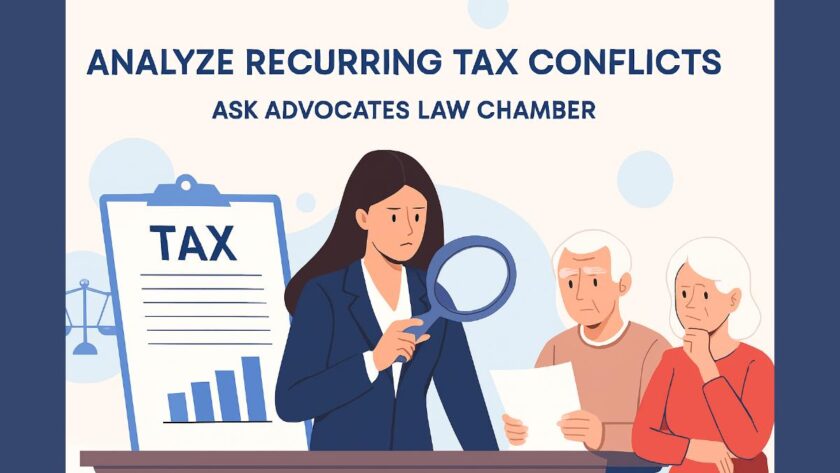Analyze recurring tax conflicts – Tax laws are the backbone of a nation’s economy. Yet, despite the structure and guidance, recurring tax conflicts continue to arise. Businesses across India often face uncertainty in interpreting tax provisions, especially under the Goods and Services Tax (GST) regime. The complexity of classification, valuation, and exemptions adds multiple layers of confusion.
At Ask Advocates Law Chamber, we often encounter clients struggling to manage these disputes. Each case involves intricate legal interpretation, documentary evidence, and procedural compliance. Even a minor deviation can trigger scrutiny from the tax department. Because of this, understanding the root causes of recurring tax conflicts is essential for effective defense and compliance.
Analyze Recurring Tax Conflicts, GST Refund Delays, and Litigation Pathways for Disputed Exemptions: Ask Advocates Law Chamber
Causes of Recurring Tax Conflicts
Recurring tax conflicts generally stem from ambiguities in statutory interpretation. The GST law, despite its promise of uniformity, contains several grey areas. Taxpayers frequently differ from authorities in the understanding of terms like “supply,” “composite supply,” or “place of supply.”
Moreover, classification disputes are another common trigger. Many industries—such as food processing, healthcare, and construction—face confusion regarding applicable tax rates. When an item or service falls between two possible slabs, disagreement becomes inevitable.
Additionally, procedural lapses such as incorrect filing, mismatched invoices, and missed deadlines escalate conflicts. Sometimes, system glitches in the GST portal also complicate compliance. Thus, a simple clerical mistake may evolve into a prolonged legal battle.
GST Refund Delays – A Growing Concern
For businesses, cash flow is their lifeline. However, refund delays under GST often disrupt operations severely. Exporters, manufacturers, and service providers who depend on regular refunds suffer the most. While the law mandates timely processing of refunds, the ground reality often differs.
Refund delays occur due to mismatched data, pending verification, or technical errors in the GSTN system. Moreover, authorities sometimes withhold refunds citing ongoing audits or investigations. Such actions, though precautionary, cause financial distress to honest taxpayers.
At Ask Advocates Law Chamber, we observe that refund applications frequently get rejected for procedural errors rather than substantive violations. Missing a document, a minor mismatch in invoice value, or incorrect HSN codes can invite unnecessary rejection. Therefore, detailed attention to filing procedures becomes vital for protecting the taxpayer’s rights.
Legal Remedies Against Refund Delays
When refund claims remain pending beyond reasonable time, taxpayers can invoke legal remedies. The GST Act provides mechanisms such as appeals to the Appellate Authority, and further recourse to the Appellate Tribunal and High Courts.
However, before pursuing litigation, taxpayers should exhaust departmental remedies. Representations and rectifications often resolve issues at the initial stage. Still, when authorities fail to act or act arbitrarily, judicial intervention becomes necessary.
Courts have consistently upheld the principle that delayed refunds violate the right to conduct business under Article 19(1)(g) of the Constitution. Hence, taxpayers can claim interest on delayed refunds as compensation. Our firm regularly represents clients in such matters to ensure fair treatment and financial redress.
Disputed Exemptions – A Complex Legal Challenge
Another major source of tax disputes involves exemptions. The GST regime includes multiple notifications granting conditional exemptions to specific goods, services, and entities. However, the conditions attached often lead to interpretational differences.
For example, many organizations face disputes over whether their activities qualify as charitable or educational under the exemption provisions. Similarly, questions arise about the scope of exports, zero-rated supplies, and input tax credit eligibility.
Authorities, in their zeal to protect revenue, sometimes adopt narrow interpretations. This creates unnecessary hardship for taxpayers acting in good faith. The problem intensifies when exemption notifications lack clarity or contradict each other.
To address such issues, legal counsel plays a crucial role. Proper legal analysis, backed by judicial precedents, can demonstrate the taxpayer’s bona fides. At Ask Advocates Law Chamber, we conduct in-depth reviews of exemption claims to build strong, defensible positions.
Litigation Pathways for Tax Disputes
When dialogue fails, litigation becomes inevitable. The GST law provides a multi-tier dispute resolution structure. The first step usually involves filing an appeal before the Appellate Authority. This stage focuses on factual and procedural review of departmental orders.
If the outcome remains unsatisfactory, taxpayers can approach the GST Appellate Tribunal. The Tribunal examines both facts and legal issues, providing a fair opportunity to contest departmental interpretations.
Subsequent appeals lie before the High Court and Supreme Court, especially when substantial questions of law are involved. These forums ensure constitutional balance and protect taxpayers from arbitrary state action.
However, litigation demands strong documentation, detailed pleadings, and sound legal reasoning. It also requires deep familiarity with precedents, circulars, and case law. Our firm’s litigation team, experienced in complex tax disputes, provides comprehensive representation across all judicial forums.
Importance of Advance Rulings and Clarifications
To prevent disputes, the GST law introduced the concept of Advance Ruling Authorities (AAR). These bodies provide clarity on specific transactions before execution. By obtaining advance rulings, taxpayers can ensure compliance and avoid future litigation.
Yet, even AAR decisions sometimes lead to conflicts, especially when different states issue contradictory rulings. To mitigate this, the Appellate Authority for Advance Rulings (AAAR) offers a review mechanism. Nonetheless, national consistency remains a challenge until a centralized authority is introduced.
Therefore, while advance rulings are a preventive tool, they are not foolproof. Businesses must remain vigilant and continuously review evolving judicial trends.
Documentation – The Foundation of a Strong Defense
In tax litigation, documentation is everything. Properly maintained invoices, agreements, correspondence, and reconciliations strengthen a taxpayer’s credibility. Missing records or inconsistent entries often weaken the defense, regardless of merit.
Maintaining digital records, ensuring accurate input-output reconciliation, and filing returns on time can drastically reduce exposure. Furthermore, internal audits by professional tax consultants help detect potential issues early.
Our firm advises clients to adopt proactive compliance strategies. A small investment in preventive documentation can save years of litigation and financial stress.
The Role of Technology in Tax Dispute Resolution
With increasing digitalization, technology plays a major role in tax administration. The GSTN system automates returns, refunds, and compliance tracking. However, the same system sometimes causes disputes due to technical mismatches and system downtime.
Artificial intelligence tools and automated reconciliation software can help businesses detect discrepancies early. Moreover, electronic submission of appeals and online hearing facilities now streamline litigation.
At Ask Advocates Law Chamber, we use advanced digital platforms to track client matters, file submissions, and monitor case progress in real time. This transparency ensures faster resolutions and better compliance management.
Judicial Trends and Recent Case Law
Recent judgments have shown a balanced approach by courts in tax disputes. The judiciary increasingly emphasizes natural justice, procedural fairness, and taxpayer rights. Courts have repeatedly held that technical lapses should not overshadow substantive compliance.
Moreover, they have directed authorities to issue refunds promptly and avoid withholding legitimate claims without valid reasons. This judicial trend reflects growing awareness of the hardships caused by administrative delays.
In disputed exemptions, courts often interpret provisions liberally in favor of taxpayers when ambiguity exists. This principle—commonly known as interpretatio favorabilis—encourages fairness and trust in tax administration.
Strategic Litigation Planning
Every tax dispute requires a customized litigation strategy. A reactive approach often leads to unnecessary escalation and cost. Instead, strategic planning helps businesses manage risks effectively.
Before filing an appeal, it is crucial to assess the merits, available evidence, and potential precedents. Moreover, parallel negotiations with authorities can sometimes achieve settlement without court intervention.
At Ask Advocates Law Chamber, we focus on comprehensive risk evaluation before initiating proceedings. We analyze the financial impact, legal strength, and long-term business goals of each client. This holistic approach helps in achieving favorable outcomes through both negotiation and litigation.
The Need for Policy Reforms
While businesses must comply, the government must also ensure that tax administration remains efficient and fair. The increasing number of disputes highlights the need for clearer laws and simplified procedures.
Uniform guidelines for exemptions, faster refund mechanisms, and robust appellate frameworks can ease taxpayer burdens. Moreover, introducing centralized digital dashboards for refund tracking and dispute management would improve transparency.
Legal reforms should also encourage accountability within tax departments. When officers act beyond their authority or delay processes without reason, taxpayers deserve legal protection and timely remedies.
International Comparisons and Best Practices
Globally, several countries have adopted efficient tax dispute resolution models. For example, nations like Singapore and the UK emphasize mediation and advance rulings to prevent litigation. Similarly, the U.S. system allows structured settlements before formal adjudication.
India can adopt similar models to minimize disputes under GST. Collaborative compliance, taxpayer charters, and online conciliation can transform the current system into a more cooperative framework.
Our firm, with international exposure, advocates adopting such global best practices in India’s legal and tax systems.
The Human Impact of Tax Disputes
Behind every tax dispute lies a business, a workforce, and a community. Prolonged litigation drains resources and damages reputation. Entrepreneurs who wish to focus on growth often get caught in procedural loops.
Therefore, resolving disputes efficiently is not only a legal necessity but also an economic priority. By minimizing conflicts and ensuring timely refunds, the government can promote business confidence and investment. Our firm’s philosophy centers on protecting not only financial interests but also the dignity of businesses that contribute to national growth.
Frequently Asked Questions
Recurring tax conflicts often arise from ambiguous provisions, classification disputes, and valuation issues. Many businesses face confusion about what qualifies as “supply” or “exempt service.” Misinterpretation of tax rates or errors in filing returns also lead to notices and audits. Moreover, conflicting circulars and varying departmental interpretations increase litigation.
Refund delays usually occur due to system mismatches, verification bottlenecks, or pending departmental approvals. Sometimes, refunds are withheld if audits or investigations are in progress. Even minor errors like invoice mismatches or incorrect HSN codes can stall the process. Therefore, maintaining perfect documentation and timely follow-up with authorities is crucial for faster refund clearance.
Taxpayers can file representations to the GST officer, appeal before the Appellate Authority, and, if necessary, approach the High Court under writ jurisdiction. Courts have consistently held that undue refund delays violate the constitutional right to conduct business. Therefore, taxpayers are entitled to interest on delayed refunds. Proper legal representation ensures that claims are processed efficiently.
Disputed exemptions require careful legal analysis of notifications, circulars, and case precedents. Businesses must prove eligibility through valid documentation and compliance with conditions. If authorities deny exemption wrongly, an appeal or writ petition can challenge the decision. Legal experts can strengthen the case with judicial interpretations and factual evidence.
Expert legal counsel ensures compliance, prepares appeals, drafts submissions, and represents clients before tribunals and courts. Lawyers also identify procedural lapses by tax authorities and safeguard taxpayer rights. At Ask Advocates Law Chamber, our team provides strategic guidance, ensuring swift resolution and protecting clients from unjust tax demands.
Conclusion
Tax conflicts, refund delays, and disputed exemptions represent more than just legal issues—they reflect the evolving relationship between taxpayers and the state. The GST regime, though progressive, continues to face challenges in interpretation and administration.
At Ask Advocates Law Chamber, we believe that sound legal strategy, meticulous documentation, and proactive compliance are the keys to overcoming these challenges. Through expert advocacy and deep legal insight, we help clients navigate every stage—from refund claims to appellate litigation.
Ultimately, a balanced tax system thrives when both taxpayers and authorities act with transparency and mutual respect. As the best global force in legal defense, our mission remains clear: to safeguard every client’s rights, restore financial justice, and strengthen trust in the legal system.
Read More
- Resolving Tax Disputes Under STPI: Navigating Section 10A/10B Challenges
- Top 5 Compliance Mistakes in STPI Registration and How to Avoid Penalties
- When Can NCLT Refer a Case to Criminal Court?
- Oppression and Mismanagement Cases in NCLT – A Legal Roadmap
- IBC Cases in Chennai NCLT: What Creditors and Debtors Must Prepare For
- Central Board of Indirect Taxes and Customs (CBIC) – GST section



